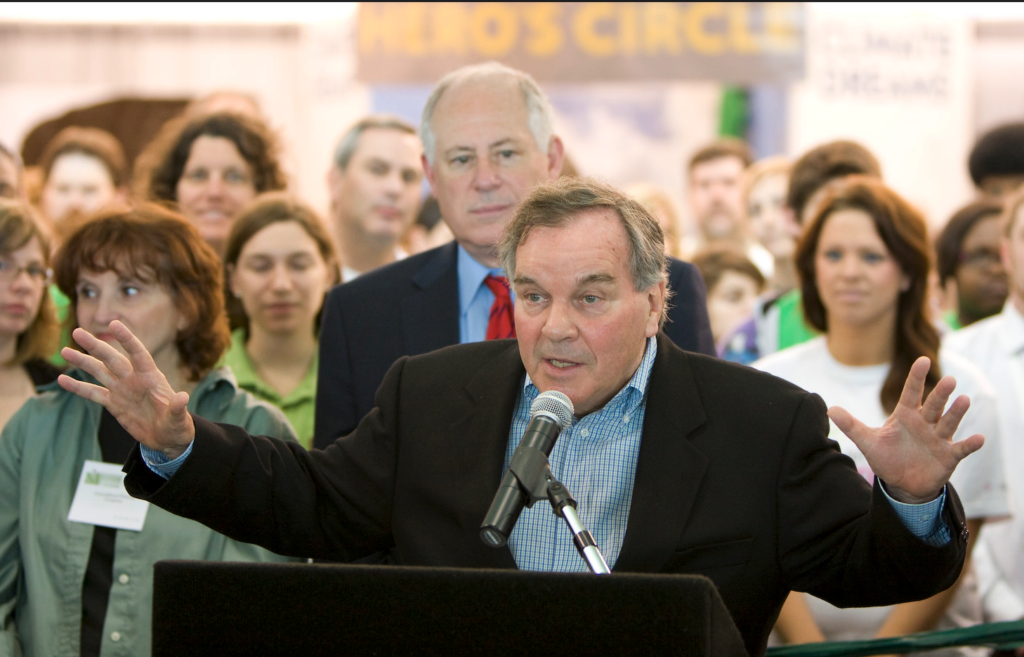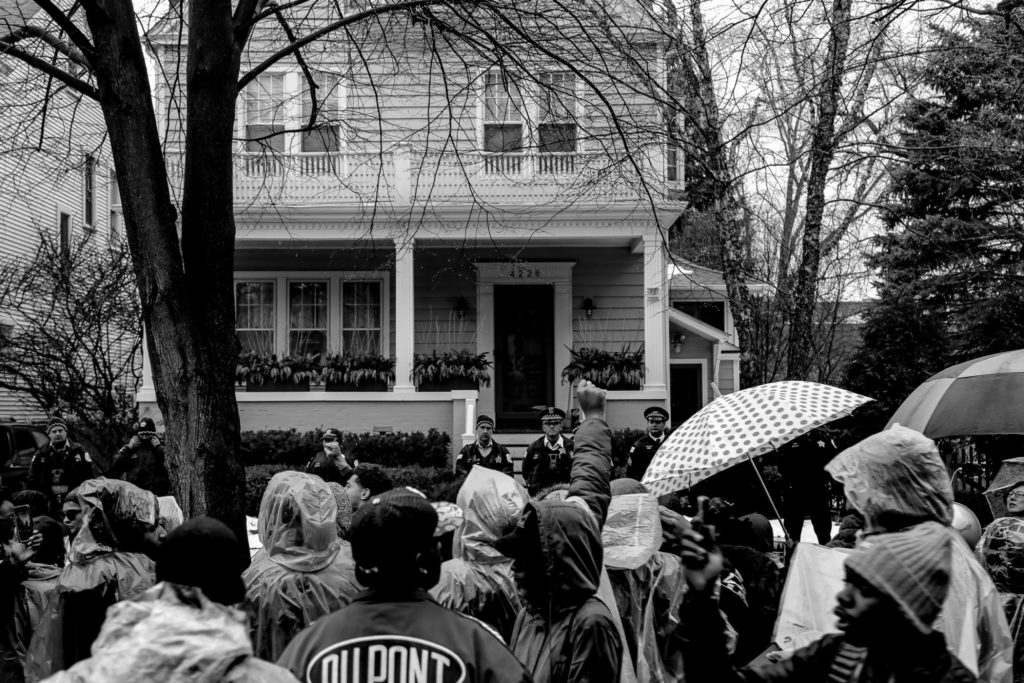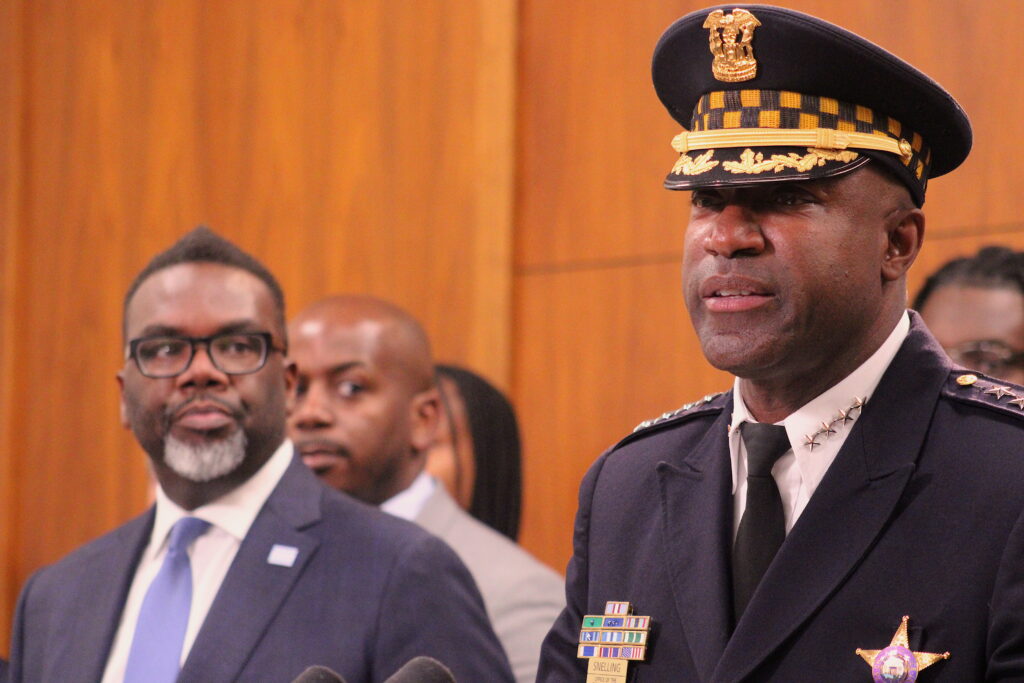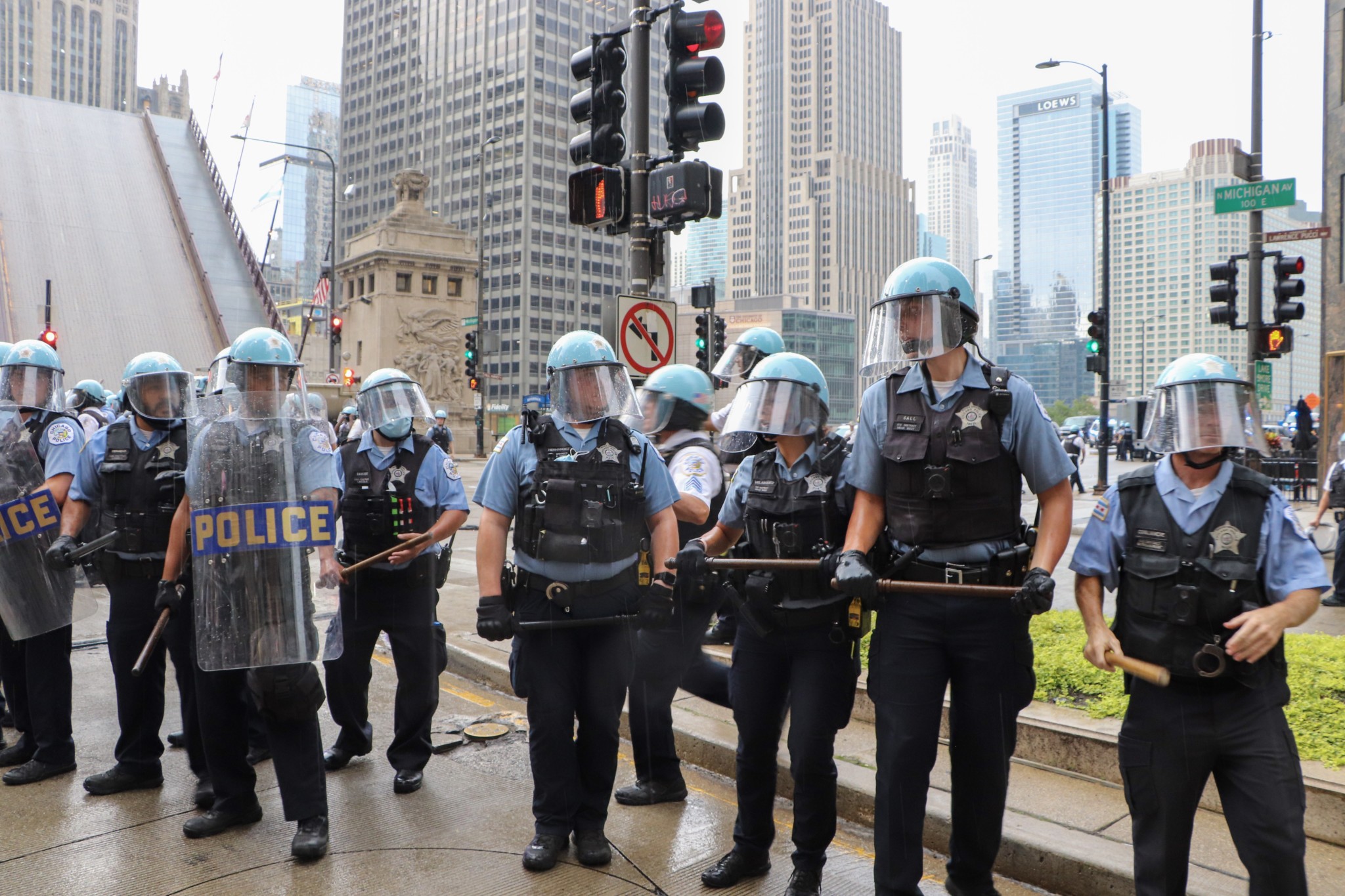The Chicago Police Department’s (CPD) budget has taken up more than a third of the city’s general operating budget, or “corporate fund,” for decades. During the administrations of our three previous mayors, a status quo of privatizing and cutting funding for other public institutions has been complemented by a steady increase in funding for police.
Now, Mayor Brandon Johnson’s 2024 budget is set to increase CPD’s funding again. Released in early October, Johnson’s budget includes some steps forward around funding alternatives to police for mental health and youth violence prevention. But it also raises CPD’s budget to almost $2 billion, a 2.8 percent increase from 2023. The City Council is required to approve a budget before the end of the year and is set to vote on it today.
Since at least 2014, a re-energized movement against police violence has brought specific attention to the size of CPD’s budget compared to that of other needed city programs. In 2020, that movement was influential enough that six socialist alderpeople co-wrote a Sun-Times op-ed arguing that “cutting funding for police could lead to a better and safer Chicago.” And now, those six alderpeople have multiplied in their ranks of somewhat like-minded representatives in City Council, we’ve elected a mayor who ran on an approach to public safety that centers around “investing in people,” and the narrative around police and resources has shifted dramatically.
Still, we’re not seeing cuts to the police budget.
The saying that budgets are moral documents may be true, but it is equally true that they are political documents—reflections of where there is power and where there is political will. And there is always some power behind the status quo by virtue of it being entrenched. Changes to the status quo, however, require both power in the form of organized pressure from communities and social movements, as well as political will on the part of decision-makers. Chicagoans have become familiar with (and found many ways to push back against) the political idea that the city doesn’t have enough money to fund the things we need, but consistently—even when horrible police abuses are uncovered—the city has found money to fund and grow the police department. Why is this so and what does it tell us about the power of everyday people to shape the decisions that impact our lives and about the political will of the people who make those decisions on our behalf?
When Richard M. Daley took office as Chicago’s mayor in 1989, CPD’s budget was $541 million (the equivalent of roughly $1.3 billion in 2023). As the so-called War on Drugs had been underway for nearly two decades, Daley entered office in Chicago at a time when an overall approach of harsh criminal punishment and increased policing as primary ways to address social problems in Black communities went largely unchallenged in the mainstream.
Daley himself had a history of turning a blind eye to police abuses. In 1982, while serving as as Cook County State’s Attorney, he was informed by the police superintendent about a clear case of brutal police torture. Daley ignored the alarming report and spent much of that decade overseeing a prosecutor’s office that convicted countless predominantly Black men based on coerced confessions. Under his mayorship, CPD commander Jon Burge’s horrific program of torture continued largely unchecked.
Also as Daley came to power in Chicago, neoliberalism—the idea that we should shrink the role of the government, in order to allow the capitalist free market to prevail and “trickle down”—was taking hold as the dominant economic policy across the political spectrum in the U.S. Daley put this into practice by privatizing the public sector and divesting from Black, Brown and working-class parts of the city. Daley demolished high-rise public housing and failed to deliver on promises that it would be sufficiently replaced; began slowly closing public schools and making way for privately-run charters; sold off public infrastructure to create short-term revenue but long-term debt to private companies (like in the case of the widely criticized 2009 parking meter deal); and created the city’s Tax Increment Financing (TIF) funds, sometimes referred to as “slush funds,” that have been used as a way to siphon public dollars toward private development projects.

The result was that inequality grew enormously during Daley’s tenure, particularly along the lines of race, and CPD was one of few, if not the only, public institution(s) left fully funded and growing. From 1990 to 2012, roughly the years Daley was in office, average white household income grew to be double that of Black household income in Chicago. And over the course of Daley’s six terms as mayor, the CPD budget grew from taking up 36.2 percent of the corporate fund to a full 43 percent in his last budget before retiring in 2011.
In her book Becoming Abolitionists, human rights lawyer and organizer Derecka Purnell writes: “Police manage inequality by keeping the dispossessed from the owners, the Black from the white, the homeless from the housed, the beggars from the employed.” There is extensive research (and common sense narratives) to support the idea that investment in the form of jobs programs, community spaces, and housing reduces violence in a community, but those things require public investment in the same programs that combat inequality.
These are the kinds of holistic public safety policies and investments that would be most effective but get in the way of neoliberal policy-makers’ emphasis on letting profit incentives drive the economy. So instead of investing in what makes communities safe on the front-end, neoliberal political leaders invest in police to show up in communities already bound to be unsafe by virtue of their disparate lack of resources.
Upon taking office in 2011, former mayor Rahm Emanuel continued to advance a similar economic agenda as Daley. Emanuel’s efforts were accomplished via shocking and immediate blows that have become symbols of Chicago’s divestment from the public sector and the working class. Rather than slowly shutting down public mental health clinics, Emanuel closed half of the city’s twelve clinics all in his very first budget, and later closed fifty public schools simultaneously in the largest mass school closure in U.S. history.
Through privatization, Emanuel paved the way for cutting thousands of unionized public sector jobs and replacing them with lower-paying or part-time jobs staffed by contractors. This was another way neoliberal policy fueled economic precarity among the same groups of people—Black and working-class—most likely to experience police violence and criminalization.
Emanuel was also not so different from Daley when it came to addressing police abuses. He actively concealed a video of the murder of teenager Laquan McDonald, who was shot sixteen times by then-CPD officer Jason Van Dyke. Only once a court ordered the city to release the gut-wrenching dash cam footage of the murder, did the public see it. And only once there was an outpouring of protest and outrage, did Emanuel take any further action.
Emanuel increased the police budget every year he was in office (from 2011 to 2019), maintained its share of about 43 percent of the city’s corporate fund, and championed the investment of more than $95 million into the construction of a fancy new police academy that is now operating on the West Side.

When the COVID-19 pandemic hit and millions more Americans were impacted by the lack of a social safety net than before, the viral video of police officers killing George Floyd in Minneapolis (combined with myriad other social factors) sent Chicago, like many cities, into a wave of protest and unrest. Calls to “defund the police” were both galvanizing and incredibly polarizing, but at the heart of the statement was actually a profoundly common political opinion.
That year, a city-administered budget survey showed that 87 percent of nearly 38,000 Chicagoans who responded wanted to see the city reallocate police funds toward other needed city services and institutions like the libraries, schools, and the department of public health. (Most people have a much more diverse vision of what they believe deserves funding than what our actual budget reflects.) Regardless, when federal COVID relief dollars came in, and while many Chicagoans and local businesses continued to struggle from pandemic shutdowns, then-Mayor Lori Lightfoot put $281.5 million of that federal funding toward CPD. Much of it paid for overtime pay for officers assigned to police protests.
Over the course of Lightfoot’s one term as mayor, the police budget increased from $1.76 billion to $1.94 billion, although its overall share of the city’s corporate fund declined from 39.9 percent to 35.8 percent. She will, however, always be remembered to many Chicagoans as the mayor who raised bridges, trapping youth protesters downtown in May 2020, and gave COVID relief money to fund police overtime while many families and neighborhoods struggled.
When Johnson started his run for mayor, his “root-cause” approach won him cautious support from a large swath of the city’s abolitionist and police reform movements (myself very much included), and was also used against him in countless attacks from his opponents.
Initially, Johnson campaign commitments included reallocating $150 million from CPD, funding a year-round youth jobs program as another violence prevention measure, canceling the city’s contract with ShotSpotter, an acoustic gunshot-detection technology, and closing the notorious Homan Square police detention facility. To the dismay of some early supporters and in a context of near constant attacks and fear-mongering around crime, Johnson later promised “not to cut one penny” from CPD’s budget. Regardless of his official stances, Johnson was branded a “defund” candidate, which gained him both supporters and opponents. He was understood to be someone who was planning to invest in young people and not more cops and, notably, he still won more than 70 percent in every majority-Black ward in Chicago.

Johnson and an increasingly polarized City Council have inherited a police force that makes up about a third of the city’s workforce and a landscape of public institutions that have been systematically privatized and underfunded. So what does this year’s proposed police budget tell us about where there is power and where there is political will?
Overall, the mayor’s proposed budget shows some effort and intention to take a different approach to public safety, but maintains the behemoth CPD budget. Outside of the police budget, we see a $15 million increase in funding for mental health services which will allow the city to expand the Treatment Not Trauma (TNT) model for non-police crisis response that will send mental health workers instead of cops to crises and funding to re-open two new public mental health centers. In a statement, TNT campaign leaders applauded the investment and pledged to “fight until everyone in every neighborhood has the accessible, police-free, quality mental health care that we deserve,” affirming that they will continue to fight for more.
And the budget earmarks funding for an added 4,000 youth jobs, some of which is promised to go toward piloting GoodKids MadCity’s Peacebook proposal. The Peacebook would set up neighborhood peace commissions in areas most impacted by gun violence and pay young people to be peacekeepers, training them in violence interruption, mediation and restorative justice skills. The details of this are yet to be determined as the Peacebook Ordinance continues to move through City Council.
That’s to name a few of many places we see this type of investment in next year’s budget.
Nevertheless, a $55 million increase brings the CPD budget up to $1.99 billion (from $1.94 billion this year) and fails to advance an interconnected process of diverting resources away from policing under-resourced communities and resourcing them instead. While that $1.99 billion now makes up 35 percent (the lowest share of the corporate fund CPD has accounted for since before Daley was in office), it is still a much, much bigger share than what surveyed Chicagoans say they’d like to see when compared to things like public health or community services.
Salary increases, a $50 million grant for policing connected to next summer’s Democratic National Convention in Chicago, and some added positions all contribute to the net CPD budget increase. Overall, there are a similar number of total positions in the police department, but some notable changes in what those positions are. There are 833 fewer standard police officer positions, a number of promotions of officers to “middle management” positions that make higher salaries but spend less time patrolling, and the 400 new civilian positions across the department that the mayor has widely celebrated as part of his intention to bring “civilianization” to the police force.

What that means is creating more jobs inside of CPD that are not sworn police officers with guns and arresting power. In this budget, that includes doubling the staff inside the department’s Office of Community Policing with more community organizer positions and domestic violence advocates. It also includes added staffing for the Office of Constitutional Policing and Reform tasked with monitoring compliance with the federal consent decree.
It is important here to distinguish between what is being called “civilianization” (which still grows the police department) as different from visions for civilianization that are about redistributing police officer responsibilities to other workers and departments. An emphasis on the latter, which could look like a more visionary and sizable investment in jobs that support public safety outside of the police department, would instead be a stronger approach and reflect a meaningful shift in who is understood to be doing the work of keeping us safe. Treatment Not Trauma offers one good example of this. Domestic violence leaders have also spoken up about how the new advocate positions would better support survivors if housed outside of the police department. Instead of adding more positions to CPD, we could look at the current 1,500 vacant police officer positions and increased budget for CPD recruitment and put those funds toward other kinds of jobs in other departments that address the root causes of violence and other social problems.
On top of to what’s now baked into next year’s CPD budget, which includes $1.1 billion in Fraternal Order of Police contract position salaries, future budgets will be locked into delivering a 16 to 20 percent raise to CPD officers over the next four years if the city’s tentative agreement with the FOP is approved by City Council. There’s also still a line item for the city’s current contract with ShotSpotter that is up in February. Whether it gets renewed will be another important decision point around police funding. If the contract is not renewed, it is important that the funding stream isn’t redirected to another harmful surveillance technology.
Organizers across the city have been advocating for an approach that sees community investment as going hand-in-hand with the reallocation of funds away from the police department, which is itself responsible for so much violence. What we can interpret from this year’s proposed budget is that there is now enough power from the movement and from communities to successfully win investment in non-police approaches to public safety and crisis, but still not yet enough power or political will to take funding away from the police department.
Chicago movements have worked hard to diagnose and expose the problem of excessive police funding, having opened up a dramatically different public conversation about safety and police funding, built creative programs that serve as alternatives to police all across the city, and worked to create the conditions in which a lot more is possible than just a few years ago. As we look to future budgets, it is on those same movements to grow our power through organizing and leverage political will toward solutions that invest in the wide-range of needs our communities have in order to be safe.
Asha Ransby-Sporn was South Side Field Director for United Working Families’ field program for Brandon Johnson and UWF’s slate of progressive aldermanic candidates, and has organized specifically to cut the police budget in Chicago with various groups for years.

